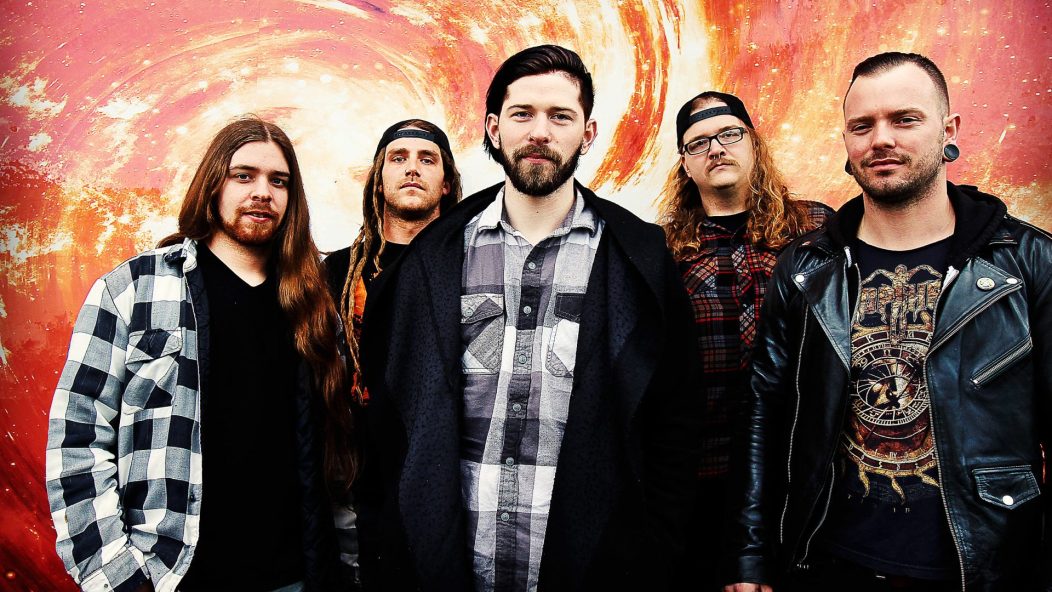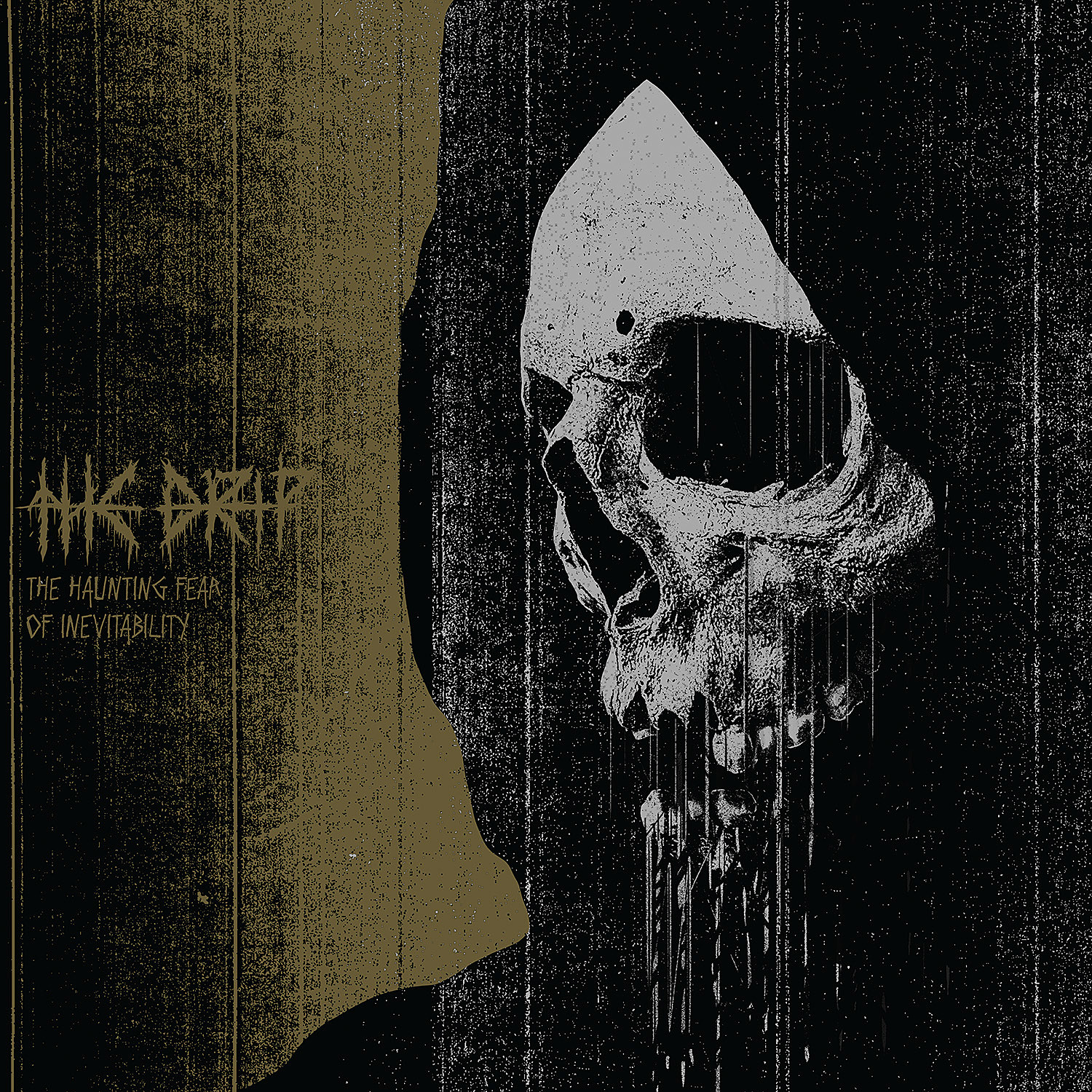
How to Live With Your Own Death, a Conversation with The Drip
…
In Latin, memento mori means “remember that you have to die.” In Roman times, after generals returned home from battle, slaves would remind them that death would no doubt come for them, too. In art and literature, memento mori is a symbolic reminder of mortality. Shakespeare’s Hamlet, who found himself surrounded by death throughout the play, holds the skull of a court jester and is reminded of his own eventual, unavoidable fate.
Grindcore, like those absolutes, is full of similarly heavy matter — clashing particles and rough, textured noise, where meaning is hard to grasp. Often, you’re just there for the ride. And like life, the grindcore ride can be painfully brief. The sudden explosion of sound that is the genre’s trademark is a brutal assault to the psyche, usually absorbed in short increments.
But now stretching those piercing moments to the breaking point is deathgrind quintet The Drip (Shane Brown on drums, Brandon Caldwell on vocals, Bobby Mansfield and Blake Wolf on guitar, Talon Yager on bass).
The five-piece hails from Richland, Washington, home to a slumbering nuclear site and an otherwise catatonic live music scene. Their first gig was at the now-shuttered Ray’s Golden Lion, a veteran rock club that once boasted visits from Meat Loaf, Tiny Tim and Ike and Tina Turner.
The Drip released their self-titled debut EP and its companion The Wasteland EP a day apart in January 2013 and set up shop on underground label Grindcore Karaoke, later signing with Relapse Records. Their 2014 EP on that label, A Presentation of Gruesome Poetics, boasts a heavier, more tightly wound style than previous work.
The Drip’s new album, The Haunting Fear of Inevitability, examines death’s mysterious underpinnings while exploring themes of domestic violence, religion and inner turmoil.
Each crushing second of music is loaded with rattling blast beats and strata upon strata of shredded guitar. Vocalist and songwriter Brandon Caldwell molds his demonic growls into ugly, monstrous gusts of wind.
The Haunting Fear of Inevitability is out Friday, Jan. 13 on Relapse Records. Follow The Drip on Facebook. I spoke with Caldwell recently about the new album. We also touched on perceptions of death in some cultures, what it’s like living without a solid music scene, and how the band’s dark aesthetic is formed.
—Emily Reily
…
…
Can you talk about how the band got together?
My bass player Talon, I’ve known him since high school. We mutually found out that we listen to heavy metal so we started hanging out. He had a band back in the day called Mortal Remains. They were kind of like a little deathcore thing going on. They had met these older dudes who took them under their wing. They were in this band called Sand. It was this blackened death metal project. Some of the guys in Sand decided they wanted to start a grindcore band that was a little fun, project-joke thing. At first it was kind of not so serious, but then we started getting more and more serious. Some of the images of the band in the beginning was more like potty humor and just really immature. Then we just matured and came into our own sound. It’s been about 10 years now. Blake, he’s been with us about three years now and he’s been a real blessing so I think we’re gonna stick with him. Compared to when we first started as a group, we now have a more polished and refined sound and image than before.
Did everyone in the band grow up in Richland?
I think Shane grew up in Port Angeles. Talon grew up in a place about an hour from here. I grew up in Kansas, in Peoria, in the middle of nowhere.
What was it like living in Kansas?
There wasn’t much going on. We had a Walmart, we had a mall that had a JC Penney, and a movie theater. I didn’t even know about scenes or anything like that. I didn’t even know what a skater kid was until I moved to Washington. I moved to Washington when I was 12 so it wasn’t like I would have been super into going to shows [back then].
Why did you move to Washington?
My dad got offered a really good job here. He worked at a power plant over in Peoria called Wolf Creek. He’d done outages over here at Hanford Energy Northwest. When I was younger he just used to describe it as the Homer Simpson job where he sits in a room and presses buttons.
What’s the grindcore scene like in Richland?
There’s practically no scene where we’re from. There used to be, but all the venues have shut down. It was kind of slowly declining over time. And now there’s no place to do any all-ages shows. There’s a place called Walla Walla 30 minutes away from here that’s a college town. They’ve gotten Napalm Death and Black Breath to play there.
What were some of your favorite venues to play in Richland before they all shut down?
The one that I pretty much grew up with here was Ray’s Golden Lion. It was like this Japanese little bar place that did karaoke and stuff like that. It was just always the place I would go on weekends when I was younger. It almost didn’t even matter what band was playing, it was just kind of the place to hang out. People don’t really do that anymore. They would just show up and they would sit outside and smoke cigarettes, and complain about having to pay $7 for a show. I don’t know. It just all slowly went downhill. Now there’s just nowhere, really. Other places would pop up from time to time and they would be in business for a couple of months but nowhere stayed open for very long. Ray’s was pretty much around for gosh, I wanna say 15 years probably. I remember hearing about it when I was in 7th grade.
How do you come up with song ideas?
For me, song ideas and lyrics come to mind over time. Sometimes I’m inspired by a piece of literature I read or a philosophical idea. It usually takes a couple years to work out some of the ideas in my head, but they usually end up coming together when I need them to. This album exhausted most of the absolute best ideas I had saved.
What are some bands that you admire?
Well I’m gonna have to say Napalm Death, as clichéd as that sounds. I’ve seen them two times now. [For] one of them, we had the pleasure of sharing the stage [with them]. Their sound is just ferocious. They’re so solid. I wanna be that good at my craft at that point in time later on. Nasum is one of those bands that really pushed the line for grindcore. There are times when I’m listening to, let’s say Human 2.0 or even Shift. They were such a melodic band; borderline punk at times. I almost don’t even want to classify them as grindcore, but there’s nowhere else to put ‘em. I really like Rotten Sound too. There’s few bands that I can name that are truly just heavy; like if you wanna scare someone that doesn’t listen to metal, that’s what you’d put on.
…

…
What are some of your favorite songs on The Haunting Fear of Inevitability?
Probably the strongest one is “Anathema.” I really like how that song came across. It’s very well structured. The arrangements are perfect. The vocals and the message are all just great. My second favorite song is “Wretches.” The song doesn’t sound like anything we’ve ever written before. It’s very slow and doom-y. There’s not a single blast beat in it the whole time, and our sound very heavily relies on that. Lyrically it’s the best one on the album. It came together really really well.
I like “Covered In Red” a lot. That one is very, really melodic. And it’s really dark-sounding. I really like the way that one came out. It’s the longest one on the CD.
I like “Painted Ram”. Your vocals sound like this big force coming from another place. How did you learn to growl like that?
I’ve been doing it for about 10 years now. One of the people that actually showed me how to do vocals was the guy that originated that style, John Huber from I Declare War. He also sang for Pathology. He’s a good friend of mine. He was always really nice and supportive from the moment I met him. He was a big help with me, shaping my whole entire vocal style.
What are some themes on the new album?
Overall I’d say the theme on the new album is death. Death, anxiety. I guess there’s quite a bit of that on there. In Central American culture, they have this thing called – it roughly translates to a “memento of death” (memento mori). It’s supposed to be a tribute to the fact that one day they will die. They can’t be afraid of it. They have to accept it. In making this totem, or this memento, it’s like a rite of passage that they do. I kind of feel that way about this album. I kind of put a lot of grief and anxiety into it. There’s quite a few themes that could seem a bit controversial. Most of the songs do revolve around death and anxiety; others have a more occult taboo approach.
Do you have a lot of personal anxiety about death?
I guess I could say I do, but a lot of people do. Everybody gets to thinking about stuff and has an existential crisis at some point. I’d rather express it in an artistic mode than let it sit in my mind and stew, [to] get it off my chest.
That’s my problem, I let it sit in there.
I think a lot of people will be able to relate to this album because it’s something we all think about, and especially in American culture. A lot of fear surrounds death. In other cultures, it’s not. There’s tribes that when you die, they think it’s a good thing. They all celebrate. ‘You’re passing on to another life. We’re celebrating your life, not your death.’ A lot of cultures see it as a transition. Americans and Christians they all fear it. It’s like a sad thing.
I saw a show recently about an Indonesian culture where, if a member of the family dies, the others treat the person like they’re still alive. He gets embalmed and maybe sits in a chair in the family’s house, and they bring him food three times a day until they eventually bury him.
I think I’ve heard about this before. That’s really intriguing.
It kind of grosses you out— that death is like right there.
That’s just their cultural norm. It seems so strange and taboo to us. We don’t even have any culture here in America really. We’re only a couple hundred years old. We’ve established nothing.
Do you think you’d ever leave the Northwest or maybe move to Seattle for a better live scene?
I want to go to Japan eventually.
Why would you go there?
I’m obsessed with Japanese culture. Hardcore music and grindcore music and that cross-punk style is really, really popular over there.
…











